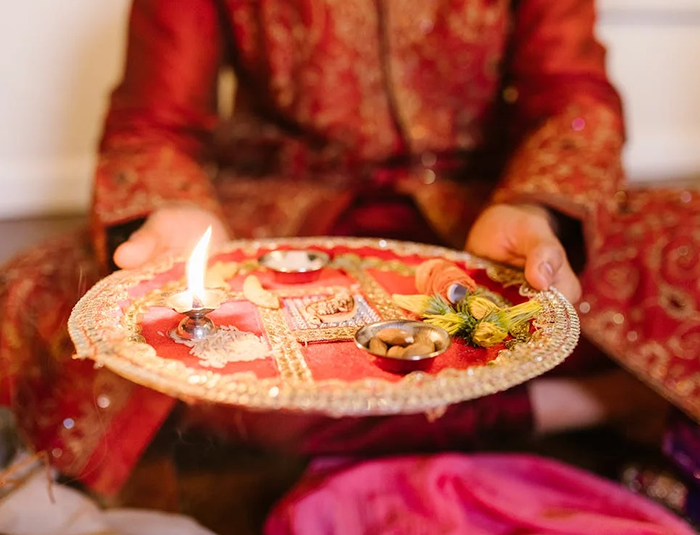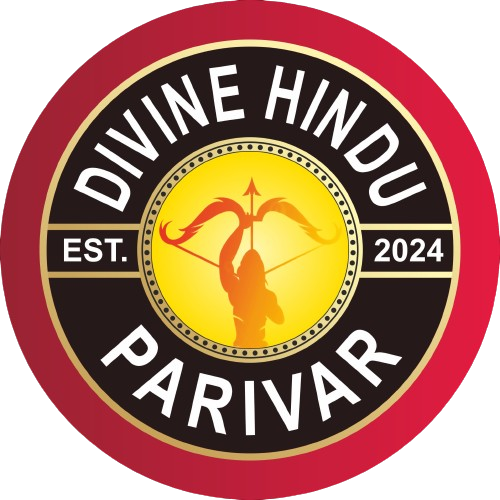
In Hinduism, a “Vivah Puja” is a sacred marriage ceremony and ritual performed during a Hindu wedding. The term “Vivah” refers to marriage, and “Puja” signifies a religious ritual or worship. Hindu weddings are elaborate and are steeped in religious and cultural traditions. The Vivah Puja is a significant part of the wedding, and it involves various rituals and ceremonies that are conducted to seek the blessings of the divine for the couple’s marital life. Here are some key aspects of the Vivah Puja:
- Ganesh Puja: The wedding ceremony typically begins with a Ganesh Puja, where Lord Ganesha, the remover of obstacles, is worshipped to ensure the smooth and successful conduct of the wedding.
- Vara Puja and Kanya Puja: The bride and groom are individually worshipped and blessed. The groom’s feet are washed, and he is offered gifts and a special meal. The bride is also offered gifts and blessings. Both of them are considered incarnations of Lord Vishnu and Goddess Lakshmi during the ceremony.
- Sankalpa: The priest, bride, groom, and their families make a solemn commitment to conduct the wedding and live harmoniously as a married couple.
- Exchange of Garlands (Jaimala): The bride and groom exchange floral garlands, symbolizing their acceptance of each other as partners.
- Mangalsutra Dharan: The groom ties the sacred thread, known as “mangalsutra,” around the bride’s neck as a symbol of their marital union.
- Saptapadi: The most significant ritual in the Vivah Puja involves the bride and groom taking seven rounds around a sacred fire, while making seven vows to each other. Each vow signifies different aspects of their married life, including love, respect, and companionship.
- Kanyadaan: The bride’s parents offer their daughter to the groom in the presence of the sacred fire and the deities.
- Sindoor Daan: The groom applies sindoor (vermilion) on the bride’s forehead as a symbol of her married status.
- Ashirvad (Blessings): The priest and elders of the family bless the newlyweds for a happy and prosperous life together.
- Reception and Celebrations: The Vivah Puja is followed by a grand wedding reception and celebrations, which may include a feast, music, dancing, and cultural performances.
About Vivah (Marriage)
Hindu marriage/vivah/wedding joins 2 people forever, so they will pursue Dharma (duty), artha (possessions), Kama (physical desires), and moksha (ultimate religious release) along. it’s a union of 2 people as husband and married person, and is recognized by law. In Hinduism, marriage/vivah/wedding is followed by traditional rituals for consummation. In fact, marriage/vivah/wedding isn’t thought-about complete or valid till consummation. It additionally joins 2 families along. Favorable colors are usually red and gold for this occasion.
Eight Types of Marriage
1. Brahma Marriage 2. Daiva Marriage 3. Arsha Marriage 4. Prajapatya Marriage
5. Gandharva Marriage 6. Asura Marriage 7. Rakshasa Marriage 8. Paishacha Marriage
Importance and Significance of Marraige/Vivah Puja
Marriages became a multi-day celebration. There are numerous pre-wedding functions. Pujas performed in each function have some significance. Vivah could be a very sacred union. several Gods and Goddesses are invited through numerous rituals to come and bless the couple. Marriages are set within the cosmos however the union sanskaar is completed through a Vivah Puja. The Agni is the sakshi or the witness to the present Holy Union. the guarantees created throughout a Vivah Puja are hole life commitments that the bride and also the groom build to each other. A Vivah Puja is formed of assorted rituals and every ritual is important.
Benefits of Vivah Puja (Wedding Puja)
- Blessings of all the Devs and Devis.
- Blessings of our fore fathers and ancestors.
- Participation of assorted relations within the Vidhi.
- Formation of 2 souls as per Vedic beliefs.
- Unity between the bride and also the groom.
- Physical, Mental, Social, Legal and religious connections between the bride and also the groom.
- Awareness of responsibilities towards one another and each other’s families.
- Awareness of their duties within the social established.
- An opportunity to procreate with everyone’s blessings.
- An opportunity to possess janam janam Ka saath(life long partnership) along with your partner.
